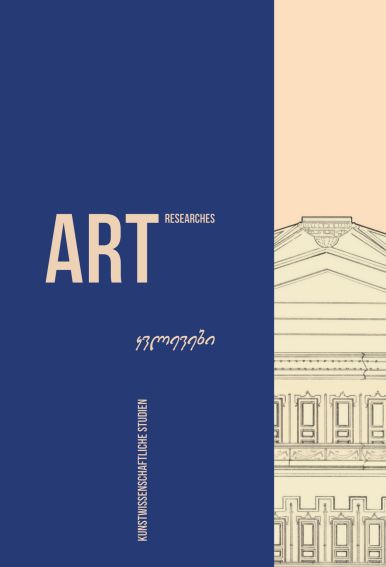რომანტიზმის კულტუროლოგიური ფენომენი
Main Article Content
ანოტაცია
Romanticism, despite its generally European origins and forms of expression, also includes concrete national aspects. For this reason, this literary movement arose in various European countries at almost the same time.
In the European directions of Romanticism (unlike Georgia...) the phenomenon of aesthetic-artistic interpretation of the philosophical schools is extremely systemic. This is also refl ected in the corresponding manifestos. Returning to the Georgian literature, the philosophical sense integrated in the artistic code has proved to be the most acceptable, natural and therefore easy to understand for our artistic consciousness and for our ethnopsychology in general.
Romanticism represents such a style of world view that achieves the fi xation of thought only by focusing the sensations and emotions/feelings. That is why the constant aversion always overlaps with the eternal regularity of life.
It is precisely this current, as the artistic depiction of creative boundlessness and life alienation, that has found a rather fertile “literary ground” in ancient Georgian literature, but it is impossible to grasp it without the conception and interpretation of the Romantic archetype, which is completely unimaginable.
At the beginning of the 19th century in Georgia there were universal conditions for the emergence of Romanticism. This was caused by the general apathy and “political nihilism” of the Russian annexed Georgia. The same condition brought to light an artistic sign unusual for Romanticism - the “Romantic code” of consciousness of state power. At first sight, the emotional turmoil caused by the struggle for state power and the romantic sentiments, which have been exaggerated to the extreme, should be totally incompatible.
The original interpretation of the “world-weariness” sprouting on the ruins of the Bagrationi dynasty kingdom has just given an impetus to the emergence of Georgian romanticism.
Georgian literature had maintained its “creative will” in Romanticism as a general European cultural worldview. Starting from its “inner essence”, Romanticism provided a certain interpretation of the preceding chrestomathic literary concepts - thanks to the “rebellious creative spirit”.
For this reason a “global humanity dilemma” emerged - “world-weariness”, which in European Romanticism formed a “mystical field” loaded with literary symbols... This tendency was not foreign to Georgian Romanticism either.
The 19th century, which began with Romanticism, was not only a “new literature” transformed into a concrete “creative view” or a “new world outlook”, but it formed the “new thinking” of the whole Europe; moreover, Romanticism, starting from its standard, founded a completely new “center of the world”, in which precisely the Romantic pathos became the universal language of the world outlook.
